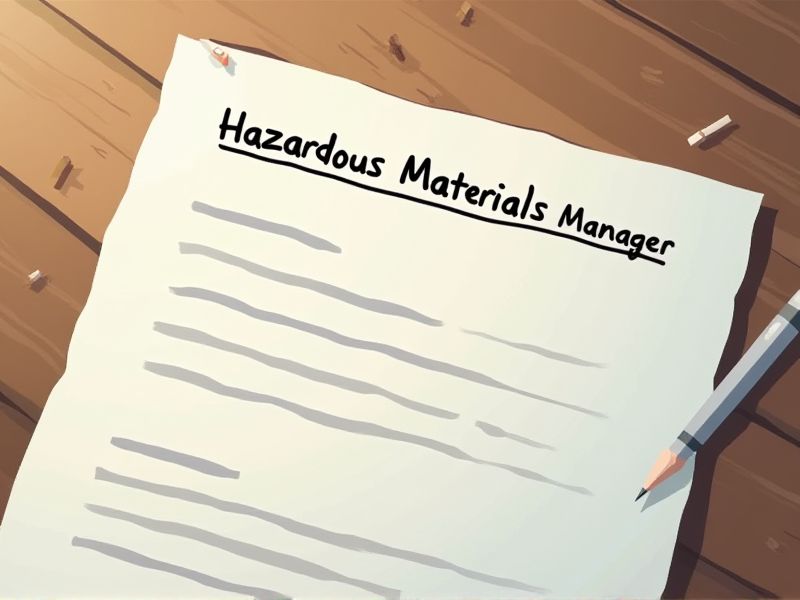
Hazardous Materials Managers play a critical role in ensuring workplace safety by effectively managing risks associated with dangerous substances. Due to the potential health and environmental threats posed by these materials, comprehensive knowledge and skills are necessary. Certain certifications validate a manager's proficiency in handling and regulatory compliance. Here are some important certifications required for a Hazardous Materials Manager.
Certified Hazardous Materials Manager (CHMM)
A Certified Hazardous Materials Manager (CHMM) provides expertise in regulatory compliance, reducing the likelihood of environmental law violations. This certification validates a professional's capability to effectively manage hazardous materials, mitigating the risk of accidents and spills. The presence of a CHMM can improve the implementation of safety protocols, fostering a safer workplace environment. CHMMs possess up-to-date knowledge on hazardous materials management, crucial for ensuring that all procedures adhere to the latest standards and regulations.
OSHA 40-Hour HAZWOPER Certification
Hazardous Materials Managers often face environments with potential exposure to toxic substances, making OSHA's 40-Hour HAZWOPER Certification crucial for ensuring their safety and that of others. The certification provides comprehensive training in handling, storing, and disposing of hazardous materials, reducing the risk of workplace incidents. Regulatory compliance is a significant responsibility for these managers, and possessing an OSHA certification helps meet federal standards. Enhanced knowledge from the certification aids in successful emergency response and crisis mitigation.
Hazardous Materials Technician Certification
Certification as a Hazardous Materials Technician equips managers with essential skills to respond effectively to spills and accidents. Increased regulatory requirements necessitate that managers possess in-depth knowledge of hazardous material handling to ensure compliance. Possessing this certification demonstrates a commitment to safety, bolstering organizational credibility and trust. Enhanced understanding from the certification empowers managers to implement and oversee safety protocols efficiently.
Transportation of Dangerous Goods (TDG) Certification
Lack of Transportation of Dangerous Goods (TDG) Certification can lead to improper handling and increased risk of accidents involving hazardous materials because certified personnel are trained to manage these substances safely. Organizations with TDG Certified managers experience fewer regulatory violations since certification ensures adherence to legal requirements and international standards. Efficient hazard management decreases liability for companies due to the implementation of best practices learned during TDG training. Certified managers facilitate smooth and compliant shipment processes by understanding the intricacies of labeling, documentation, and emergency response.
Certified Safety Professional (CSP)
A Certified Safety Professional (CSP) provides essential knowledge in risk assessment, directly enhancing a Hazardous Materials Manager's ability to identify potential threats. With CSP certification, managers gain advanced techniques in safety protocols, ensuring more effective containment and mitigation strategies. The credential demonstrates a commitment to industry standards, which often translates to improved compliance with regulatory requirements. CSPs tend to have a deeper understanding of the latest safety technologies, thereby fostering a safer work environment in hazardous materials operations.
Certified Industrial Hygienist (CIH)
Certified Industrial Hygienists (CIH) possess specialized knowledge in identifying and evaluating hazardous materials, which enhances safety protocols. Their expertise in risk assessment leads to more effective exposure control strategies. By understanding regulatory compliance, CIHs help organizations avoid legal penalties. Their skills in health risk communication facilitate informed decision-making for management and workforce.
Environmental Management Systems (EMS) Certification
Environmental Management Systems (EMS) Certification helps establish standardized procedures, leading to more effective management of hazardous materials. By certifying in EMS, a hazardous materials manager can ensure compliance with regulatory requirements, reducing the risk of legal penalties. Improved environmental performance through EMS certification enhances an organization's reputation, attracting environmentally-conscious partners and clients. An EMS framework also fosters continuous improvement, enabling better resource management and reduced environmental impact from hazardous materials.
EPA Hazardous Waste Operations Certification
The EPA Hazardous Waste Operations Certification ensures that Hazardous Materials Managers are trained to handle and respond to hazardous substances safely, reducing the risk of environmental contamination and health hazards. Compliance with this certification is required by federal regulations, making it a fundamental credential for those responsible for overseeing hazardous waste operations. Proper training outlined by the certification enhances a manager's ability to implement safety protocols and emergency response measures effectively. Employers and clients can trust certified managers to maintain workplace safety and uphold legal standards, minimizing liability and ensuring regulatory compliance.
NFPA Hazardous Materials Response Certification
The NFPA Hazardous Materials Response Certification ensures a manager possesses essential skills for safely handling and managing hazardous materials. Proper certification reduces risk of accidents and ensures compliance with safety regulations. This credential also enhances a manager's ability to develop effective emergency response plans. Certified managers often bring increased confidence and trust from employers and team members.
Certified Environmental, Safety, and Health Trainer (CET)
The absence of Certified Environmental, Safety, and Health Trainers (CET) in hazardous materials management often results in improper handling due to a lack of standardized safety training. This leads to increased risks of accidents and health issues among personnel managing hazardous materials. With CETs, organizations benefit from a consistent and expert-led approach to safety protocols, thereby reducing potential regulatory violations. Certified trainers also improve emergency response readiness, drastically reducing the potential for large-scale environmental contamination.
Summary
With certifications, you enhance your credibility as a Hazardous Materials Manager, leading to increased trust and responsibility within your organization. You are likely to observe improved job performance due to the specialized knowledge gained from the certification process. Career advancement opportunities become more accessible as you demonstrate expertise and commitment to professional growth. Organizations may also benefit from reduced compliance risks and improved safety measures under your management.
